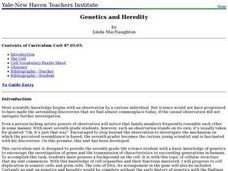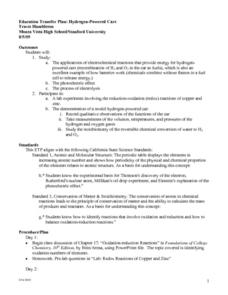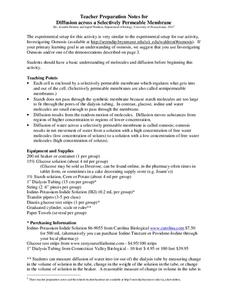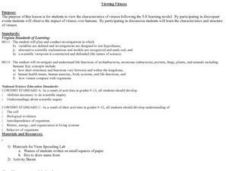Curated OER
Cell physiology and chemistry
Young scholars design an experiment to discriminate between chemical diffusion, osmosis, facilitated diffusion and active transport through a membrane. Be specific about predictions and interpretations!
Curated OER
The Meaning of Genetic Variation
Students investigate variation in the beta globin gene by identifying base changes that do and do not alter function, and by using several Internet-based resources to consider the significance in different environments of the base...
Curated OER
Using the Microscope
High schoolers demonstrate their ability to properly make observations using a compound microscope. They prepare an onion skin slide and focus on it in both low and high power. Then they measure the diameter of one of the cells.
Curated OER
Sizing Up the Supersize Croc
Young scholars examine and compare traits of humans and crocodiles. In this crocodile lesson students use a ratio to estimate the height of a person and compare that to a crocodile.
Curated OER
Biology: Genetics and Heredity
Seventh graders explore the connection between genetics and heredity by examining the cellular structure. Among the numerous activities to engage students are drawing DNA molecules, vocabulary puzzle sheets, and predicting possible...
Curated OER
Feed Me, Seymour
Students work in small groups to create posters illustrating the major facts and functions of plant organs. Within their groups, they assume the role of specialists creating specialized posters pertaining to the different parts of plants.
Curated OER
How Do Flowering Plants Reproduce
Young scholars investigate how flowering plants reproduce. They identify and describe the functions of the major sexual organs of a flower and fruit by examining and dissecting flowers and fruit.
Curated OER
Hydrogen Powered Cars
Students apply the principles of chemistry to investigate the concept of how a hydrogen powered car works. They study the electrochemical reactions that provide the energy source. Students also record observations in the functioning of a...
Curated OER
Anatomy Review
In this biology activity, high schoolers examine the internal functions of the human body while considering the factors needed to explain the physiological reactions.
Curated OER
Making Connections: Exploring Our Brains through the Five Senses
Students record observations and create drawings and models of anatomy using their five senses. They describe the structures of a neuron and analyze each of their functions. They compare and contrast the typical structural features of a...
Curated OER
Live Well Now to Live Longer Later
Ninth graders select a topic to research, completing the sentence, "Are the effects of _______ really that detrimental to one's health?" They record information in a journal, including sources of information. Students work in groups with...
Curated OER
Mitosis and Meiosis
Learners model and differentiate between the processes of mitosis and meiosis. In partners, they use yarn and construction paper to create models for each of the phases of mitosis and meiosis then compare the chromosome numbers in each...
Curated OER
Who Wants to be a Cellular Biologist?
Eighth graders review concepts in cellular biology. In this biology lesson, 8th graders play an interactive game based on the idea of winning money. They discuss misconceptions about the topic.
Curated OER
Elastic Recoil in Arteries and Veins
A lab in which high schoolers examine the difference between arteries and veins. Budding biologists will find out which blood vessel can stretch furthest, recording their data in a table then answering several questions evaluating their...
National Nanotechnology Infrastructure Network
Save the Dinosaurs with Copper and Zinc!
Create a coat of armor for dinosaur volunteers. Young scientists explore the oxidation-reduction reaction facilitated by electric current. The result of the reaction is a dinosaur coated in copper and zinc, which leads to an...
Curated OER
Nervous Tissue
In this nervous tissue worksheet, students list and describe the functions of the nervous system and its two principle parts. Then they list and give the function and location of the six types of glial cells. Students also describe two...
Curated OER
Diffusion Across a Selectively Permeable Membrane
Students investigate how water passes through cell membranes. In this biology activity, students differentiate osmosis and diffusion. They illustrate the movement of water in both processes.
Curated OER
Cancer in My Classroom I
Student explore cancer, its causes, and various types. Young scholars research compare/contrast a health cell to a cancer cell. They compare treatments available for childhood cancers.
Curated OER
Edible DNA
Students use multicolored soft candies (gumdrops and candy orange slices) and toothpicks to create models of DNA structures. They discuss the fact that DNA must copy itself before splitting into two cells. Students demonstrate this by...
Curated OER
Viewing Viruses
Students view the characteristics of viruses following the 5-E learning model. By participating in discrepant events Students observe the impact of viruses over humans. By participating in discussion students examine the characteristics...
Curated OER
Background Reading and Coral Dramas
Students create a dramatic play. In this coral lesson, students explore the anatomy of coral. Working in groups, students research the form and function of coral and present a skit to represent their learning.
Curated OER
Colored Shadows
Students explore how different colors are seen through the cone cells in our eyes. In this light lesson students complete a lab activity with light and record their observations.
Curated OER
Genetics - Critical Thinking
In this genetics instructional activity, students review terms and processes associated with genetics. This instructional activity has 2 multiple choice and 21 matching questions.
Curated OER
Protein Synthesis and Words
High schoolers explain the roles of mRNA, tRNA and ribosomes. They explain how mutations can occur in an individual. Students simulate parts of a cell to access about the process of protein synthesis.

























